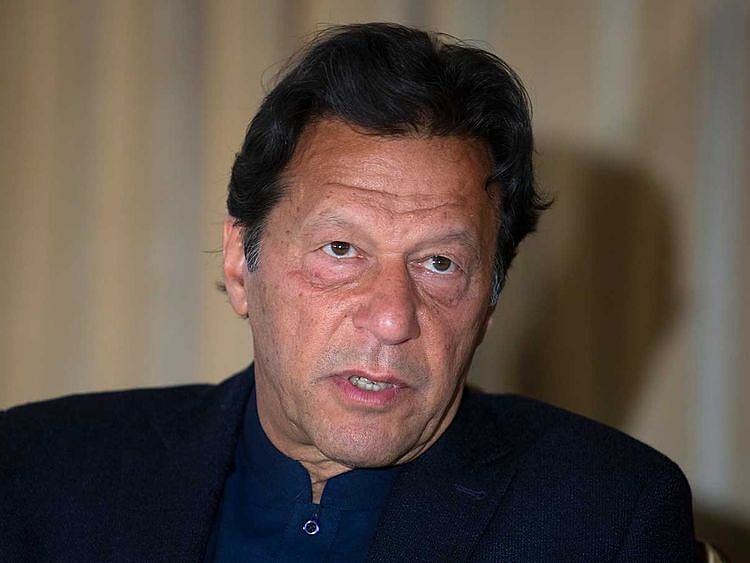Also In This Package
Photos: Pakistan begins vaccination of senior citizens
Pakistan's 'Charlie Chaplin' bringing joy in Peshawar
Pakistani stars are racing to Dubai
Photos: Electricity restored in Pakistan after blackout
Photos: Pakistan's famous truck art goes airborne
Pakistan launches anti-polio drive amid tight security
Islamabad: Prime Minister Imran Khan has urged the global community, particularly financial organisations to offer debt suspension and relief to help developing nations recover from the crisis triggered by the COVID-19 pandemic. He also called for a more equitable vaccine rollout.
Addressing the virtual special segment of the UN Economic and Social Council (ECOSOC) in New York, Pakistani premier highlighted the need to mobilise funds “needed by developing countries to recover from the COVID-induced recession and restore them on the path to achieving the Sustainable Development Goals by 2030”. Khan also asked the private creditors to “participate in providing debt relief and restructuring” to protect people from massive socio-economic fallout” of the pandemic.
Earlier in January at a UN meeting, Khan had proposed a five-point agenda for emergency financial support to developing countries, including debt relief and restructuring, Special Drawing Rights (SDR) creation and redistribution, larger concessional finance, and an end to illicit financial flows from developing countries.
He welcomed the IMF proposal to create $650 billion in new SDRs, and appreciated the support from the largest shareholders including the US, China, the EU and Japan. Noting that G-20’s debt suspension has been extended, he said that its scope should encompass all vulnerable countries, especially the small island developing states. Pakistani premier also pushed the idea that developing countries should be able to borrow from the markets at the prevailing low interest rates available to developed countries. “The liquidity and sustainability facility, proposed by the economic commission for Africa, could be one way to achieve this,” he said.
Vaccine nationalism
Pakistan successfully contained the first two waves of the virus through a policy of “smart lockdowns” and also launched $8 billion relief package to support the poor and vulnerable, and to keep the economy humming, Khan said.
As the world is now battling the third wave of coronavirus, the international community “must ensure that the vaccine is available to everyone, everywhere, as soon as possible.” He also urged that “Production of the vaccine must be ramped up. Patent and technology-transfer restrictions should be waived to enable this.” He deplored the “vaccine nationalism and export restrictions” as well as the use of the vaccine to advance national foreign policy objectives.
Illicit financial flows
Khan noted that the UN panel on financial accountability, transparency and integrity (FACTI) has proposed 14 recommendations to halt the outflow of trillions of dollars from developing countries. “These recommendations should be endorsed by the UN and all financial institutions. The stolen assets of developing countries must be returned immediately and, more importantly, unconditionally.” He also proposed the imposition of a global minimum corporate tax to avoid profit-shifting and tax avoidance by corporations.
At the same meeting separately, the UN Secretary-General Antonio Guterres also asked governments to consider imposing a ‘solidarity or wealth tax’ on those rich who profited during the pandemic to cut extreme inequality as “there has been a $5 trillion surge in the wealth of the world’s richest in the past year.” Guterres also urged to extend and expand debt service extension by the G20 and big emerging powers to help low- and middle-income countries recover from the pandemic.
Help fight climate change
At the summit, Khan also shared Pakistan’s green ambitions of planting 10 billion trees over the next three years, and introduction of renewable energy, electric vehicles and a moratorium on new coal-burning power plants to combat challenged posed by climate change. He called upon the developed nations to “fulfil their commitments under the Paris agreement and mobilise $100 billion annually in climate finance” and devote 50 percent to adaptation programs of developing countries to make the transition to a green global economy.
“We are at a critical point in world history,” he said. “We must disavow power rivalries and geopolitical competition. We must opt for unconditional international cooperation. Together, we can – we must – construct a new, peaceful, equitable and sustainable world order.”
Sign up for the Daily Briefing
Get the latest news and updates straight to your inbox
Network Links
GN StoreDownload our app
© Al Nisr Publishing LLC 2025. All rights reserved.
